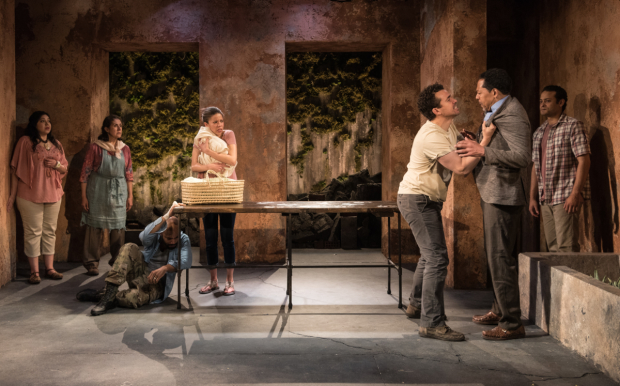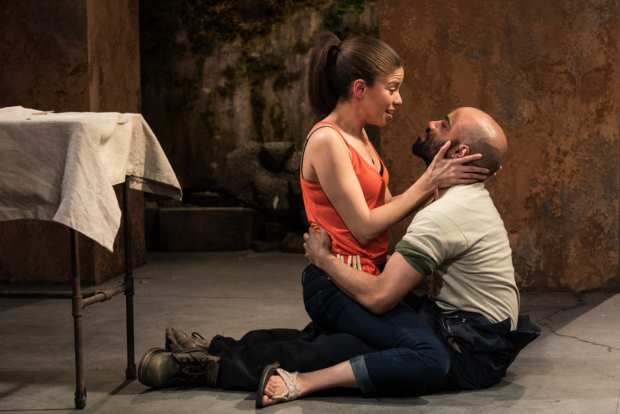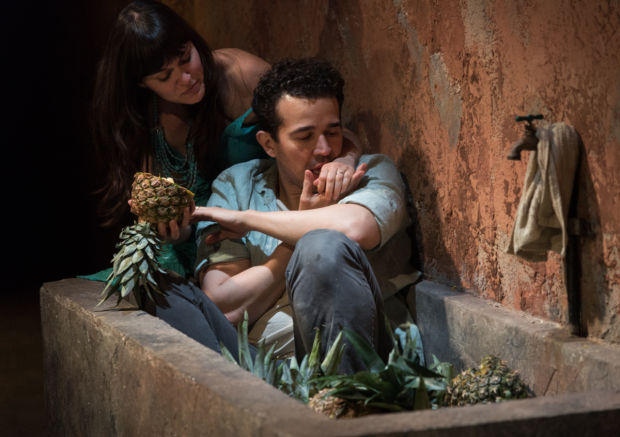Seven Spots on the Sun

(© Russ Rowland)
There's a sickness in the country. Children are dying shortly after developing hideous boils and fevers that refuse to lift. Is it a coincidence that this plague has arrived at the end of a brutal civil war, when the resentment among countrymen still festers like an infected pustule? Illness is most decidedly a metaphor in Martín Zimmerman's Seven Spots on the Sun (take that, Susan Sontag). The derivative play is now appearing at Rattlestick Playwrights Theater (in collaboration with the Sol Project) in a beautiful and beguiling production from director Weyni Mengesha. Even if you feel like you've seen it all before, Mengesha makes the watching worthwhile.
The story takes place in an unnamed Latin American country in the hamlet of San Isidro (named for the Catholic saint who helped reconcile a deeply divided Spain during the Dark Ages). Luis (Sean Carvajal) has quit his job in the mines and joined the army, using his enlistment bonus to buy Mónica (Flor De Liz Perez) a washing machine. He promises her that he'll never go to war, a pledge he breaks when a military junta backed by the "gringos" overthrows the democratically elected P.P.R. government. A merciless civil war ensues. Doctor Moisés (Rey Lucas) and his wife, Belén (Flora Diaz), tirelessly treat the victims of this conflict, including P.P.R. guerillas, something that causes them to run afoul of the military government. But considering his miraculous talent for healing, the soldiers wouldn't dare harm Moisés, would they?

(© Russ Rowland)
An allegorical town in Latin America, thinly veiled leftist politics, and a touch of magic: Seven Spots on the Sun feels a lot like watching a Gabriel García Márquez novel spring to life. Zimmerman (author of the recently produced gun-violence monologue On the Exhale) makes this allusion especially potent when he has the townspeople narrate major plot points, explaining their emotional significance even as the bulk of the action happens offstage. We wonder if this tell-don't-show style might be more conducive to the page, rather than the stage.
Mengesha works hard to dispel that notion with a visually arresting production that zips along at a brisk 85 minutes. Jungle overtakes ruins just upstage of the distressed peach-colored walls in Arnulfo Maldonado's set. A large stone basin with real running water occupies stage left. It all evokes Central America while offering multiple layers of playing space. Mengesha stages some of the narrated action upstage where we can just barely make it out, forcing us to fill in the gaps with our imaginations.
Tei Blow's hefty sound design further illustrates the story: We hear the guns of the combatants as if they were actually in the tiny off-off-Broadway theater. A woman's scream reverberates as she is dragged away by soldiers, simulating how her cry will echo through the memory of those who survive this barbarism. These well-executed moments of terror will be hard for audiences to forget too.
Several of the performances are also quite memorable: Perez brings believable desperation to Mónica, especially when she is pleading for the life of her child. Carvajal exudes macho intensity as Luis, making us fear even his moments of tenderness. Lucas is gentle and slightly aloof as the saintly doctor, making his latent vindictive streak all the more surprising. Lucas and Diaz also impress us with their Pineapple masticating skills (pineapples become a symbol for one's ability to still taste life after a desensitizing war). Lucas hammers into multiple piñas each night with the verve of a Latino Gallagher, searching for something he lost in the melee.

(© Russ Rowland)
When "no justice, no peace" has become a rallying cry for so many, Seven Spots on the Sun pointedly asks: After an explosion, is it more important to remove all shrapnel from the body or immediately close the wound? Can there be a lasting peace without real justice? It is a valuable question that would land with more of an impact if Zimmerman's work didn't feel so much like a throwback to past literary triumphs.











